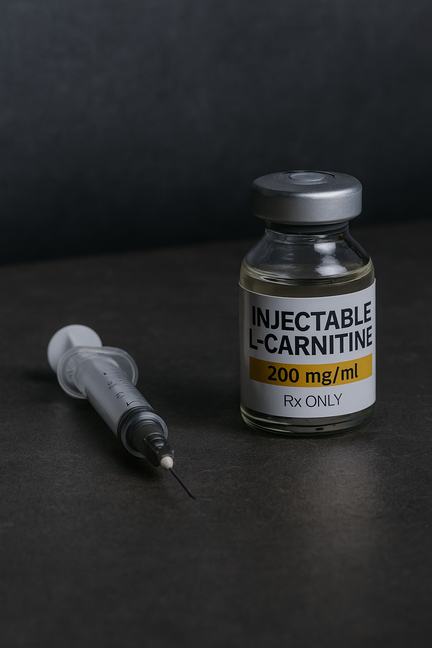If you’ve been around bodybuilding long enough,
you’ve probably heard someone swear by
injectable L-carnitine — usually right before prep,
or when they’re trying to get “that last bit” of conditioning.
Some people call it a game changer.
Others call it an expensive placebo.
The truth, like most things in bodybuilding,
is somewhere in the middle — and a lot more
interesting than the sales pitch.

What is L-Carnitine and Why Should You Care?
L-carnitine is a naturally occurring compound your body uses to transport long-chain fatty acids into the mitochondria, where they’re burned for fuel. Without it, fat oxidation slows down.
You make some L-carnitine from amino acids lysine and methionine, and you get more from eating red meat and dairy. But there’s a catch: what’s “enough” for general health isn’t always enough to squeeze out that extra edge in performance or conditioning.
For bodybuilders and performance athletes, more efficient fat oxidation means better energy use during training and more potential for fat loss during a deficit.
Oral vs. Injectable — Why It’s Not the Same Thing
Here’s the problem with over-the-counter L-carnitine pills or powders: oral bioavailability is terrible — around 10–20%.
If you actually wanted to hit effective blood levels through oral dosing, you’d be looking at around 5 grams a day. Not only is that a lot of powder, but it also brings another issue: TMAO.
When taken orally, L-carnitine is metabolized by gut bacteria into trimethylamine (TMA), which your liver converts into TMAO. Elevated TMAO levels have been linked in some studies to cardiovascular risk. Whether that risk is significant in lifters is still debated, but it’s not something you can ignore.
Injectable L-carnitine sidesteps both problems:
-
100% bioavailability
-
No TMAO production
-
Effective doses in the 200–500 mg range instead of grams
Why Bodybuilders Use It
While injectable L-carnitine is sometimes marketed as a “fat burner,” most serious users see it as a performance and conditioning enhancer with several benefits:
-
Increased fat oxidation – Especially during fasted cardio or calorie deficits.
-
Better performance and endurance – Some studies show improved oxidative capacity.
-
Improved pumps & vascularity – Likely from increased nitric oxide and better blood flow.
-
Enhanced recovery – Possible reduction in muscle soreness.
-
Synergy with anabolic steroids – Anecdotally, many enhanced athletes report better nutrient partitioning and more effective use of the muscle protein synthesis environment AAS create.
The Thyroid Connection
One of the most overlooked effects of L-carnitine is its thyroid regulation.
Research shows it can act as a normalizer:
-
In people with hypothyroidism, it can increase thyroid activity.
-
In people with hyperthyroidism, it can lower excessive activity.
This makes it especially interesting for prep — where thyroid hormone levels can fluctuate wildly from calorie restriction, stress, and cardio. If L-carnitine helps keep them in a healthy, functional range, it’s another indirect way it could help preserve metabolism during a deficit.
What the Research Says
-
Fat loss: Best results in deficient or metabolically stressed individuals; mixed results in already fit populations — though injectable dosing has been less studied.
-
Performance: Some endurance and VO₂ max improvements have been observed.
-
Thyroid regulation: Multiple studies confirm the bidirectional regulation effect.
-
AAS synergy: Mostly anecdotal; plausible mechanism via improved mitochondrial function and nutrient partitioning.
Dosage & Administration
Side Effects & Safety
-
Typical bodybuilding dose: 200–500 mg daily.
-
Injection method: intramuscular
-
Timing: often pre-cardio or pre-training; can be paired with carbs or insulin for better uptake.
-
Usually well tolerated.
-
Possible: injection site irritation, mild fishy odor (much less likely than oral form).
-
Avoids TMAO risk from oral dosing.
My Coaching Take
L-carnitine injections are not magic. They won’t replace a calorie deficit, a smart training plan, or the discipline to stick to both.
Where they do shine is for serious lifters and competitors who already have those fundamentals in place and want that final few percent advantage. Injectable form solves the bioavailability and TMAO problem, and the thyroid regulation angle is a huge plus.
I’ve seen it help enhanced and natural lifters alike — but it’s a tool, not a foundation.
If you’re not already nailing your training, nutrition, and recovery, start there first. But if you are, injectable L-carnitine might be one of the more worthwhile “extra edges” to try.


Add comment
Comments